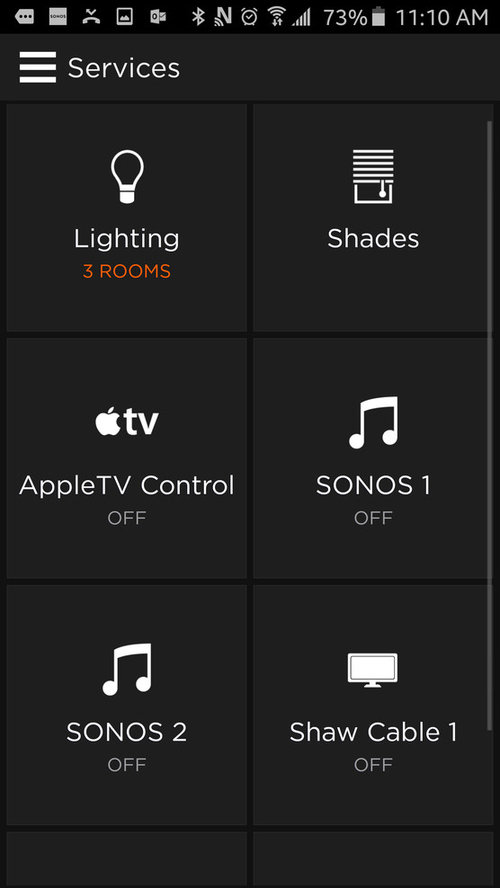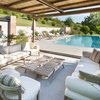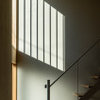POLL: Is this the year for smart technology?
I've previously posted a discussion about [smart thermostats[(https://www.houzz.co.uk/discussions/do-you-use-the-nest-thermostat-dsvw-vd~1262095?n=22), and it seems like many of you have embraced this kind of technology.
But there are plenty of other ways to integrate smart technology into your home. For instance, smart locks (keyless locks which you can open with your smartphone), smart security (setting up cameras so you can view your home remotely), wireless plant monitors and smart fridges (you can find out when you're running out of certain food products etc.).
Will you invest in any of these this year, have you already invested in them or are you sceptical and will wait? Let us know your thoughts!

コメント (16)
Finite Solutions
8年前最終更新:8年前People have been righteously sceptical about smart homes in the past few years. There were not that many devices available, or the devices that were available were either impractical or lacked proper integration with other devices. Because at the end of the day, smart home is about a network of devices (your smartphone, thermostat, door lock, lighting, security, entertainment) that could talk to each other to require minimal interaction from the user.
But we believe it's been progressively changing, especially in the past two years where tech giants got in the competition and smart home has essentially become a buzzword. If we look back, the shining industry of the recent CES shows has been smart home. Not only do we have way more devices offering various functionality, we also have more options to integrate them, thanks to the control systems such as Crestron, Control4, Savant etc.
What this means for homeowners is the opportunity to create a versatile and future-proof system that can serve great functionality for the years to come. Smart home is already a big request for homeowners who are thinking about upgrading their homes, and we believe this demand will expand rapidly into a level where smart home is not an option but a must have for new homes.
 Maison Douce Smart Home in London · 詳細
Maison Douce Smart Home in London · 詳細Amanda Robinson
8年前My last property had smart technology, lutron, crestron (everything was tied into that piece of equipment) which was 14 years old by the time we moved. And it was a nightmare. Technology will always improve / degenerate so you have to be prepared to spend money on maintaining and updating. In our present home we have zero ST - I no longer worry about power cuts or a wobbly crestron (that can only be reset by an expensive technician). Not to mention no longer worrying about health risks from the masses of electrical cabling running through the house. It's heaven.
embzop
8年前I've put a minimal amount of this technology in. I've bought remote control lighting - the Phillips Hue wireless remote control bulbs. These work well and are installed individually without having to have them linked to the modem. They have saved me having to get an electrician in to move the light switches when I changed the way the doors hang.
I really don't see the need to have everything automated and there are risks involved when the controlling unit stops working (all tech seems to have glitches from time to time) or sat on by the kids, eaten by the dog etc. If I was disabled I might consider it, in the meantime I'll enjoy the exercise.
Energy Hub
8年前Smart thermostats are certainly very now - I would think that installing a non-smart heating system is already a bit backward - as the smart systems retro fit (Nest and the like) are not that expensive compared to traditional heating controls, but are simply just much nicer to use (even if you don't use the smart features). I have used Heatmiser Neo Stat system in many underfloor heating systems - and I cannot see why anyone would use their non-smart controls (as the Neo Stat system cost little more for the thermostats - and you don't have to have the router to use them - but you can add that later). Nest (and Hive) are perfectly adequate in smaller homes (new and retro-fit) to control one or two heating areas (zones - usually upstairs and downstairs), however the wireless thermostatic radiator valve systems (such as the Honeywell Evo Home) are fantastic in larger homes, so that you can retro-fit the system and control the temperatures in each room (though the costs soon mount up).
I do like the idea of smart lighting - but costs are too high (in my opinion) for them to be a mass market product (not many people are that fussed about turning lights on and off from a tablet!) - but of course can be used as a home security device easier than setting up timers.
Smart home video cameras (to let you spy into your home whilst out) I think will grow - not only to spy on potential burglars - but as a parent I would happily spy on the kids (living spaces only!) to make sure they are home/doing homework/generally behaving when they have to be left at home alone (and paranoid parents will certainly enjoy being able to spy on the babysitter/nanny though of course in many countries this may not be legally permissible - moral issues aside).
I am surprised that there are not more smart air quality measures (not just CO2 detectors) as this is a relatively simple cost effective smart solution - and air quality is often overlooked in newer well insulated air tight homes.
Smart locking systems are very attractive - but I would be wary of relying exclusively on them for access (and would want to be very certain of the security deployment in the system - the last thing I would want is for a customer to be Ransomeware style attacks insisting on charging you to allow you back into your home.
There have been significant advances in home electricity use monitoring system - through a new breed of products that use a technique called Non-Intrusive Load Monitoring - such as the Neurio system. These guess the appliances running by signatures found in the wiring system - comparing them to known patterns (and learn where necessary) so that they can see which appliances are running and when. The great thing with these is that they can then tell you how much you spend on washing/drying/air conditioning etc. over the course of a week/month/year. They can also spot variations in the appliances so that if your cooker (or washing machine) varies from its supposed pattern they can warn you that they may be about to break ... very useful. But there are limits in the available to buy products on the market today, with many new entrants to launch in 2016 ...
So is this the year of the smart home? Perhaps for the technophile's among us - as there are loads of new and exciting toys. For the mass market - either costs are too high, or the benefits too small for things to really take off. As we (at least in the UK) move towards a smarter electricity grid, and as more smart appliances become commonplace, the potential benefits will increase (by reducing the running costs and carbon emissions from our homes) - which with falling costs will see mass adoption. Most people don't really want a complex home - they want one that is simple to use, but do want to minimise their bills (and many are aware of the environmental impacts of their lives) - and for that we need to almost "hide" the smartness of the home (in that the technology needs to do the work without pestering the homeowner - do you really need your fridge to tell you that the milk is running out? Do you really want to scan everything as you put it in the fridge? no - but you may be happy for it to add to your shopping basket for you! And you will be happy if by optimising its own use of electricity it costs you run each year.
On interoperability - best tip would be to make sure that any technology is open (has what is called a public API) so that other systems can interrogate (and sometimes control) the system (be it heating/lighting) - as that way it should work with new things as they come along (all the major heating controls do). And if possible make sure it is compatible with IFTTT - https://ifttt.com/ - the webservice that allows you to connect virtually anything! This will be (I think - and no I have no shares) the Google/Facebook and Twitter of the smart home. You can make anything react to anything - which means that you can truly customise your smart home. For example - got a smart cat flap that will let you know when the cat comes home, then use the smart heating to turn up the heating in whichever spot the cat likes to hang in. The possibilities are endless and can be totally customised to you!
User
8年前With so much technology available to improve our lives, why miss out when designing your dream home? An investment in technology during a renovation can ensure a return that will last as long as you live in the home. Future owners will also appreciate this.
indigozest
8年前We have recently opened a showroom and if the repsonse from that is anything to go by then I would say that this is the year for smart technology.
GHS Special Projects
8年前This year is definitely the year for Smart Technology (Though we may be a little biased!!!) As mentioned by Emmeline there are so many options you can look at so just depends on how far you want to take your 'Smart Home' as you could maybe just start with something small such as being able to control your lighting from your phone and see how it goes. The best part about all of this technology is that you can tailor it completely for your own needs and preferences as what someone else may have in their own may not be right for you.
User
7年前I agree that we are finally at the time when smart technology is a reality. We have seen, with our own smart security devices, that people are now ready for a Smart Home. I believe that smart home technology is here now and will continue to grow in the coming years.
davidmbrooke
7年前I'm building a new house and I've specified some Smart Home technologies - mostly for the lighting and blinds, which together can help give that lived-in look when nobody is home. I chose industry-standard technologies (DALI and KNX) so that nothing is tied to one manufacturer (who could go out of business or decide to stop making / supporting something) and there's no single central 'brain' which would cause chaos if it fails.
I agree completely on the 'open technology' point - it's nice to have an app on your phone but it's not nice to have 10 separate apps because you bought things from 10 different companies, so you want everything controllable from one place and you want the labour-saving automation of one system talking directly to another (e.g. "I've just set the intruder alarm, so nobody's home, so turn down the ventilation system").
I'd also say it's worth making a judgment on where technology is changing most and not to invest a lot in something that's likely to become out of date quickly. For example, you can pay a lot of money for fancy KNX light switches but a cheap tablet will be more flexible, and voice control with Siri and Alexa is close to being mainstream.
Heidi Cullen
7年前I'm afraid I'm completely bucking the trend and going the other way. I try and reuse items and upcycle things. My electric and gas I keep up to date and standard but everything else is manual, un-smart, painted and mended by me. Less to go wrong and cost me money I don't have.
Tim Box
7年前I follow IOT very closely. At this time security and OS updates are not sorted properly. Until the likes of Google with weave etc comes online then I'm staying clear.
I personally am going to start slowly with the likes of Google home or Amazon echo then build out over the next few years.Ecoflap
7年前As with so much technology, you need to keep in mind what you're trying to achieve. Smart thermostats present a far more attractive interface than traditional, but smart metering has shown negligable decrease in fuel use - similarly to fitenss trackers, simply installing some smart measures seem to induce a feeling of 'job done' and lead to little real behaviour change.
I identified with @9yards' comment - practise what you preach and install those measures that really do make a difference to whatever your priorities are. Few people make massive changes in one fell swoop (even on Houzz!) so smart technologies will gradually creep into most homes as old technologies become obsolete or there's a real need for something with newer, better functionality.
Tech fail is a real consideration too, which is why we don't use microchip locking on our Petflap. It sounds like such a great idea but there are so many stories of failure - cats locked out, catflaps letting in other pets when they shouldn't - so until we're happy that the technology is completely reliable we'd rather not compromise.
AVINU - Home Technology
7年前With regards to the sometimes rapid development of new technology, one thing that is relatively constant is the cable infrastructure it all sits upon. Have the right cables, in the right places and hidden within the fabric of a property does render many living spaces with huge potential for smart-home technology.
We find the term 'smart-home' is bound about and generates a technology led home perception, where the true benefit is to actually embrace any product/system that will actually benefit your life-style, make things easy to use, reliable and of course fun.
Cable is king, armed with a a good cable design the potential for a great home is within anyones reach - just go to John Lewis home technology and see what is available to the home owner 'off-the-shelf'.
We've recently helped a customer cable her own self-build: Cable my home please...AVA Projects
6年前We would agree, cabling is key, along with system design, it doesn't need to be complex but it does need fit the clients brief.




9yards architecture